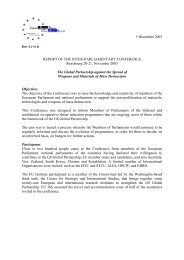The Obama Moment. European and American Perspectives
The Obama Moment. European and American Perspectives
The Obama Moment. European and American Perspectives
Create successful ePaper yourself
Turn your PDF publications into a flip-book with our unique Google optimized e-Paper software.
14<br />
Introduction<br />
decisively dealing with global challenges, the imperative of not attempting to monopolise<br />
leadership <strong>and</strong> to share evenly the responsibilities for world governance<br />
applies to any combination of world powers, say the United States <strong>and</strong> China for<br />
example. Any ‘G2’ or even ‘G3’ would be equally powerless on its own in the face<br />
of the challenges facing the international community. This is generally recognised<br />
when it comes to the economic crisis or the deadlock in trade negotiations, but it<br />
holds equally true when it comes to dealing with environmental, energy, security<br />
<strong>and</strong> other development-related issues.<br />
<strong>The</strong> conviction shared in Europe <strong>and</strong> the United States, with <strong>Obama</strong>, is that being<br />
open, democratic <strong>and</strong> culturally diverse societies, gives them the capacity to<br />
play a central role in shaping globalisation. In fact most <strong>European</strong>s share President<br />
<strong>Obama</strong>’s conviction that power politics <strong>and</strong> attempts at imposition of national interests,<br />
particularly by military force, are not only against the values they share, but<br />
are not effective in an interdependent multipolar world.<br />
<strong>The</strong> <strong>Obama</strong>-EU agenda<br />
President <strong>Obama</strong>’s international agenda is quite broad in scope, spans virtually the<br />
globe, <strong>and</strong> includes a number of ambitious goals. Some of these were pre-ordained<br />
in that they relate to disposing of an extremely difficult legacy. This included ending<br />
Iraq’s ‘war of choice’ (in <strong>Obama</strong>’s words) <strong>and</strong> dealing with the seriously deteriorating<br />
– some say hopeless – situation in <strong>and</strong> around Afghanistan. Another set<br />
of goals arise from presidential choice; these were defined <strong>and</strong> are being pursued<br />
since <strong>Obama</strong>’s first day in office. By <strong>and</strong> large, <strong>American</strong> priorities are the same as<br />
Europe’s. This can hardly come as a surprise, since US <strong>and</strong> EU interests virtually<br />
coincide as well. <strong>The</strong> argument that an agenda primarily designed to pursue <strong>American</strong><br />
interests can only run counter or be inimical to <strong>European</strong> interests or indeed<br />
any other nation’s is entirely misguided. This resuscitation of the old paradigm<br />
that competition among states is a zero-sum game could not be further removed<br />
from the <strong>European</strong> interpretation of the current international paradigm – that in a<br />
globalised world there is an unprecedented degree of interdependence of national<br />
interests. This is hardly different from President <strong>Obama</strong>’s thinking as reflected in<br />
his UN speech: ‘… in the year 2009 – more than at any point in human history – the<br />
interests of nations <strong>and</strong> peoples are shared.’ 3 This is after all what, at continental<br />
level, from Portugal to the borders of Russia, the <strong>European</strong> experience of creating<br />
converging interests has proven: that is possible to build, among states, including<br />
3. President Barack <strong>Obama</strong>, Address to the United Nations General Assembly, 23 September 2009.



